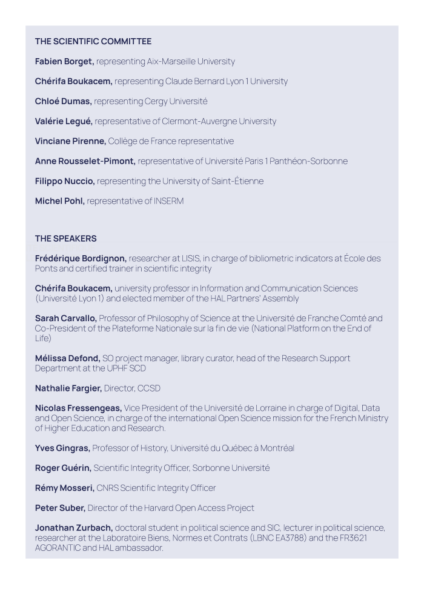Never before in the history of scientific research have integrity issues been so palpable. The move towards wider dissemination of knowledge is creating major challenges in the production and publication of scientific research.
At the heart of this transformation, open archives play a central role in promoting a particular form of scientific integrity. How do open archives, as publication platforms, contribute to maintaining scientific integrity and stimulate reflection on the evolution of scientific communication?
For the third session of the Partners’ Assembly, the CCSD is innovating by offering a thematic day rich in exchanges on scientific integrity in the context of open archives. To this end, a scientific committee, chaired by Chérifa Boukacem and composed of representatives from partner institutions, has been asked to work on the topic and to invite researchers to come and share their work on the subject.
The day was recorded and you can see the introduction below:
The other videos are available on the CCSD’s Canal U channel, so don’t hesitate to check them out (only in French).
The following is a summary of the rich exchanges of the day.
Integrity at the heart of a system
Presented by Sarah Carvallo
“Scientific integrity is […] the foundation of a relationship of trust between the world of research and the other components of society” (Office Français de l’intégrité scientifique). Integrity is therefore a value at the heart of scientific identity, guaranteeing the objective, impartial and rigorous nature of research work, as defined in the French Research Code (article L. 211-2).
As Sarah carvallo reminds us, integrity is a bulwark against falsification, embezzlement and other forms of fraud, thanks to a critical self-correction process specific to the scientific field (Bachelard, 1938). Indeed, science has the unique ability to distinguish, over time, between proven discoveries and dimensions that contradict established facts. By fostering this self-correction, integrity enables science to remain dynamic, to renew itself and to progress by abandoning obsolete ideas in favor of new understandings more in line with scientific knowledge advances.
Systemic tensions
The epistemological shift of the 1980s gave rise to a new political and institutional configuration of science, highlighting a growing need for ethics. While the self-regulation of the scientific community remains a reality, its internal functioning is problematic. In other words, the misconduct of researchers is only the visible part of deeper difficulties related to scientific standards themselves. Consequently, unless the system is corrected, situations of misconduct may persist.
In our contemporary context, the value conflicts inherent in science have become more acute. The ethical, political and social issues surrounding science underscore the complexity of self-correction processes. The mechanisms once considered the guarantors of scientific integrity now face more complex challenges, reflecting the tensions and dilemmas of an era of constant and rapid evolution.
Scientific integrity and open access
Presented by Frederique Bordignon
Open Science and Open Access are profoundly transforming the nature of research. At its inception, the Open Access movement was not conceived in relation to scientific integrity. And yet, this link is now enshrined in the French research code, defining a set of rules and values relating to research activity in order to define its character of honesty and rigor.
As a matter of principle, open archives are an effective means of making scientific production accessible, thereby increasing transparency and enabling the scientific community to verify, replicate or contradict shared results. By contributing to this transparency, open archives position themselves at the intersection of two major principles of scientific integrity: honesty and responsibility.
According to Frederique Bordignon, while the openness of science does not guarantee the integrity of research work, it does provide the necessary conditions for such a guarantee. By making science “auditable”, Open Science makes it easier to detect, combat and prevent fraud.
If Open Archives do not have to manage breaches or errors, they do have a responsibility to report corrections and retractions within their platform, says F. Bordignon. It is essential that visible markings are put in place to inform readers. This includes metadata, its completeness and quality.
Putting scientific integrity into practice in France
Presented by Remy Mossery and Nathalie Fargier
In 2021, an implementing decree established the REseau INTégrité Scientifique (RESINT), formalizing the appointment of Scientific Integrity Referent (RIS) within public institutions whose main activity is scientific research. This decree stipulates that, from now on, if a breach of scientific integrity is reported, it is up to the institution’s Integrity Referent to deal with it.
Remy Mossery explains that, at the CNRS, for example, the Mission à l’Intégrité Scientifique (MIS), operational since 2018, is composed of a multidisciplinary group of 7 researchers, including a Scientific Integrity Referent. For each report, the MIS is responsible for establishing the admissibility of the request and launching an investigation procedure if necessary.The persons implicated are then interviewed, and in about one third of the cases, the tension can be resolved through mediation/conciliation. Otherwise, a case file is compiled, in which each party presents its defense (so-called the “contradictory” phase) and is analyzed by specially commissioned experts. In very rare cases, a commission of inquiry is convened to adjudicate the case, initiating a much more cumbersome process. Depending on the outcome of the MIS, disciplinary action may be taken.
Aware of the importance of scientific integrity, the CCSD has initiated a reflection on the responsibility of HAL in the event of potential misconduct, and on the means to be put in place to collect and process reports of misconduct. This work, as presented by Nathalie Fargier, is essential to preserve the trust that the scientific community – and even more so society – places in the open archive.
